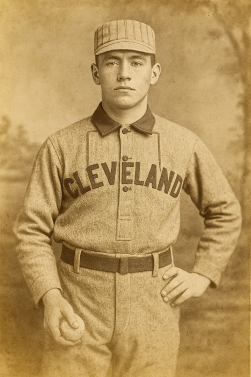The Federal League: 1879
“Storming the Ramparts”
 The Federal League’s fourth campaign marked a turning point. What had begun as Charles W. Garrison’s personal crusade in Chicago now found its new standard-bearer on the shores of Lake Erie. The Cleveland Blue Caps, admitted only the year before, stormed to the 1879 pennant with a staggering 60–23 record, leaving the rest of the league chasing shadows.
The Federal League’s fourth campaign marked a turning point. What had begun as Charles W. Garrison’s personal crusade in Chicago now found its new standard-bearer on the shores of Lake Erie. The Cleveland Blue Caps, admitted only the year before, stormed to the 1879 pennant with a staggering 60–23 record, leaving the rest of the league chasing shadows.
Expansion and Entropy
The league expanded again, this time to eight clubs, welcoming the Rochester Robins, Louisville Colts, Hartford Hawks, and Wilmington White Caps. Garrison framed the additions as proof of the Federal League’s growing prestige. Cynics whispered that expansion was less about prestige and more about plugging holes in shaky finances.
If expansion broadened the league’s map, it also widened the gulf between the strong and the weak. Cleveland, New York, Boston, and Chicago looked professional. The rest looked like stragglers.
Cleveland’s “Secret Sauce”
Cleveland’s rise was hardly accidental. The Blue Caps had mastered a brazen formula: sign other clubs’ best players. The most notorious prize was Patrick “Factotum” Manke, stolen from New York and installed in right field. As usual, Manke did everything — batting .328 with 21 doubles, 11 triples, 3 home runs, 56 RBI, and 18 steals. He led the league in nothing, but finished near the top in everything.
Supporting him was a cadre of similarly poached position players, but Cleveland’s true weapon was homegrown: 19-year-old Mike McCord. The lanky right-hander was nothing short of a revelation, going 45–13 with a league-best 1.74 ERA. He started 58 games, threw 523.2 innings, and struck out 210 batters — numbers that stunned even the most hardened cranks. McCord had been promising as an 18-year-old rookie, but in 1879 he became the undisputed ace of the league. Paired with ex-Boston pitcher Joe Henry (15–10, 2.27), Cleveland was nigh untouchable.
The Ironman of New York
Not that Cleveland’s dominance went unchallenged. In New York, Gus Murphy put on a one-man show of endurance that defied belief. The Irish ace started all 84 games for the Columbians, winning 53 of them. His 739.1 innings pitched will likely remain a record as long as the league endures. Murphy’s refusal to rest was as much stubborn pride as team necessity, and though he could not drag New York to the flag, he cemented himself as a folk hero.
Bats and Oddities
Elsewhere, the season supplied its share of curiosities. In Boston, Charlie Morris returned after a year’s absence, his fair-foul bunting trick outlawed by new rules. He reinvented himself as a slap hitter and promptly won the batting title at .341. Close behind was Chicago captain Morgan “Cap’n” Cook, who hit .335 and added daring baserunning to his growing legend.
In Hartford, first baseman Larry Buckley took full advantage of the new club’s spacious grounds, swatting a record 16 home runs — not all of them clearing fences, but all of them counted just the same. The cranks roared approval, and some wondered if base ball was inching toward a new era of power.
Boston’s catcher Hoss Metcalf added a final chapter to his peculiar career. After hitting his way to 405 at-bats and leading the league with 31 stolen bases — as a catcher, no less — the 29-year-old abruptly retired. His explanation was simple: “I love hoss’s more than people.” He left the diamond to train horses with his father in Leominster, Massachusetts, his nickname now etched in lore.
Final Standings, 1879
| Team | W | L | WPct | GB | R | RA |
|---|---|---|---|---|---|---|
| Cleveland Blue Caps | 60 | 23 | .723 | — | 466 | 314 |
| New York Columbians | 53 | 32 | .624 | 8 | 411 | 334 |
| Boston Resolutes | 46 | 38 | .548 | 14½ | 431 | 399 |
| Chicago Base Ball Club | 42 | 37 | .532 | 16 | 416 | 353 |
| Rochester Robins | 37 | 34 | .521 | 17 | 289 | 288 |
| Louisville Colts | 32 | 50 | .390 | 27½ | 278 | 338 |
| Hartford Hawks | 28 | 53 | .346 | 31 | 326 | 421 |
| Wilmington White Caps | 23 | 54 | .299 | 34 | 236 | 406 |
A League of Giants and Stragglers
The Blue Caps’ triumph confirmed Cleveland’s arrival as a major player, but also revealed the growing imbalance within the league. Garrison could still boast of expansion and stability, yet he knew the Federal League’s greatest challenge lay ahead: ensuring that the Hartfords and Wilmingtons of the world did not sink the enterprise beneath their mediocrity.
For now, however, Cleveland celebrated, Murphy limped on with pride, and the cranks marveled at a season where endurance, poaching, and sheer audacity rewrote the record books.